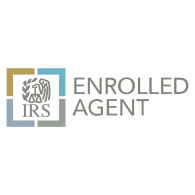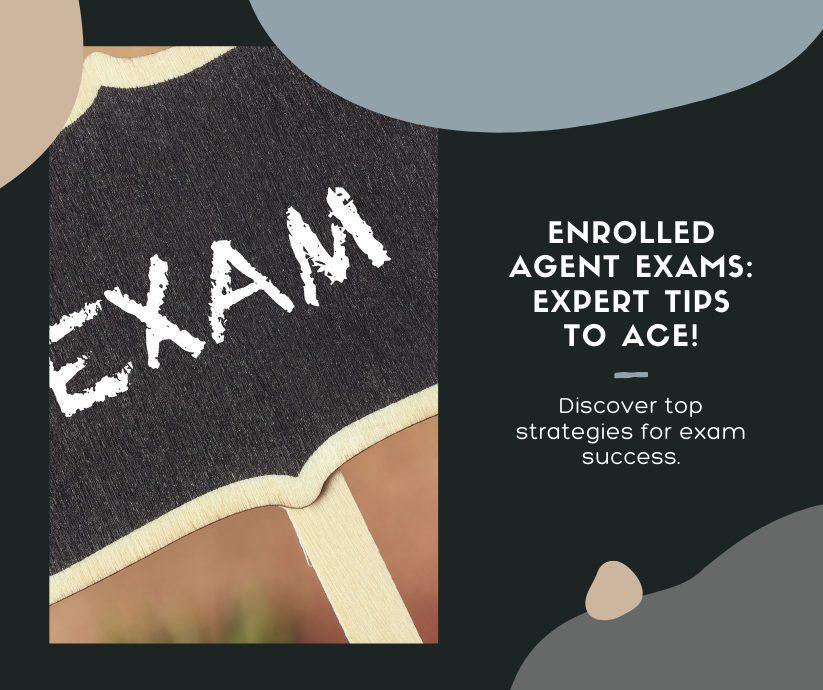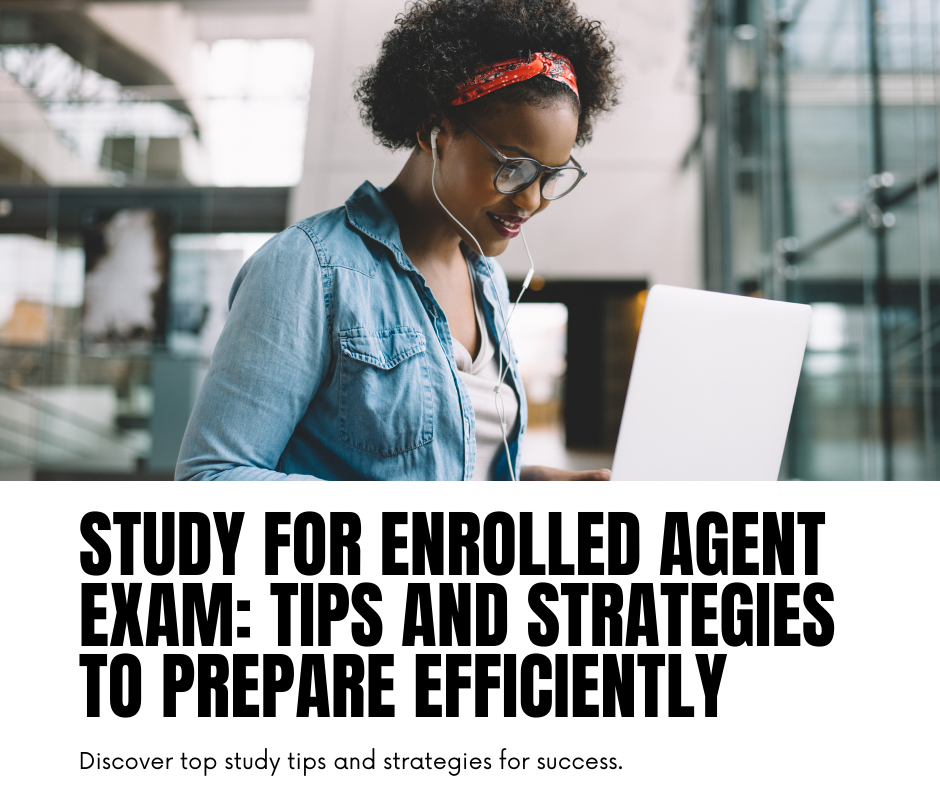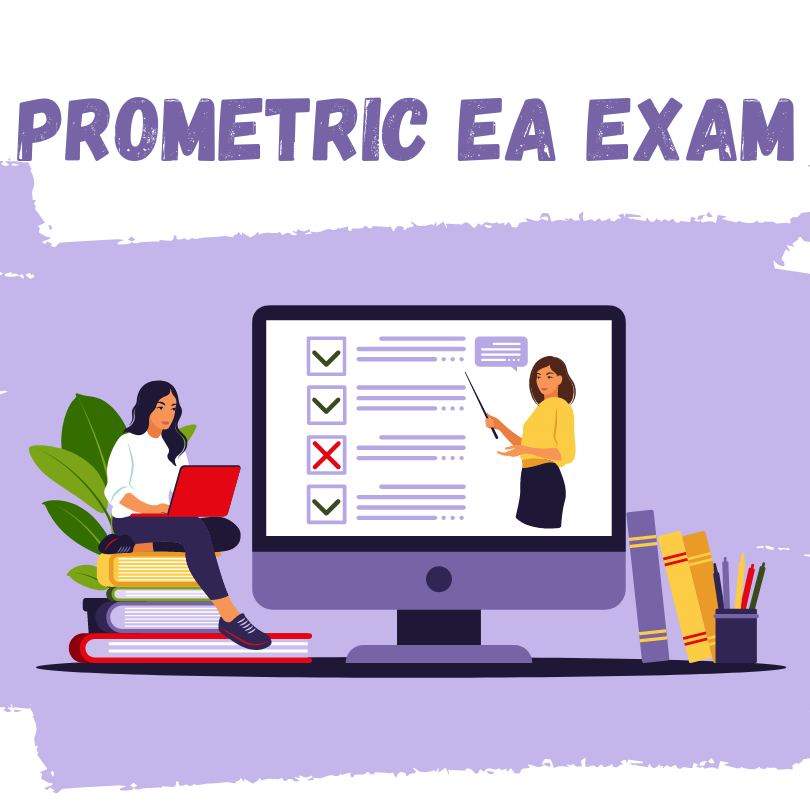Become an Enrolled Agent: Step-by-Step Guide
Passing the Enrolled Agent (EA) exam opens the door to...

Ready to learn how to become an Enrolled Agent…
There are no formal education requirements to become an EA. You do not need to have a college degree or any past coursework in accounting or taxes. EAs come from many diverse backgrounds before entering the profession. The IRS is more focused on your ability than your education when granting the EA license.
You also do not need any past work experience in taxes or accounting prior to becoming an EA. It is more about demonstrating your expertise through passing the EA exam. Some choose to gain professional experience before pursuing the EA, but it is not required. The EA credential focuses more on mastery of current tax law and IRS regulations.
To become an enrolled agent, you must pass the IRS Special Enrollment Examination (SEE). The SEE covers all aspects of current federal tax law and IRS practices. It consists of 3 separate exams that must be passed within 2-3 years. The 3 exam parts include: Individuals, Businesses, and Representation, Practice, and Procedures. Each exam takes 3.5 hours to complete at a Prometric testing center.
All EAs must pass a background check to ensure they do not have any previous criminal charges or other conduct that would disqualify them from representing taxpayers. You must obtain an IRS Preparer Tax Identification Number (PTIN) and renew it annually. Ongoing continuing education is also required to maintain EA status.
Our next topic, exploring how to become an Enrolled Agent, covers the application process. If you want to become an IRS-licensed enrolled agent (EA), you will need to complete a formal application process. Follow these key steps to submit your application and get approved to provide tax services as an EA.
Your first step is to obtain an IRS PTIN online, which serves as your personal tax preparer identification number. The PTIN is required for anyone preparing tax returns for compensation. Go to the IRS PTIN online registration system and provide some basic personal information to receive your number.

With your PTIN, you can then register to take the EA licensing exam called SEE. Administered by Prometric, the SEE consists of 3 parts that must be passed within 2-3 years. It covers all aspects of federal taxation. Test dates and locations are available year-round through Prometric.
Study rigorously before sitting for each SEE exam part. You can take them in any order. Each part is 100 multiple choice questions and you must score at least 105 to pass. Testing appointments take about 4 hours to allow time for check-in and tutorials. You can retake parts but must pay a fee each time.
Once you have passed all 3 parts of the SEE, complete the IRS Form 23 to apply for EA certification. This ensures you meet all the program requirements. Provide documentation of passing SEE scores. The IRS will initiate a suitability check as part of reviewing your application.
All EA applicants undergo a background check to verify no criminal charges or unethical conduct. This suitability check helps maintain the EA program’s high standards. If any issues arise, the IRS may request more information during the process. Once approved, you will receive your EA enrollment card.
As we continue to learn all the important details for how to become and Enrolled Agent, we wanted to share important tips. Becoming an enrolled agent requires passing a challenging three-part comprehensive exam covering all aspects of taxation. With preparation and persistence, you can be successful. Follow these tips to stay on track throughout the process.
Give yourself plenty of time before taking the exam. You don’t want to cram at the last minute. Starting to study 1-3 months in advance of each part is recommended. This allows you to thoroughly cover the material without being rushed. Take your time and don’t plan to take the test until you feel ready.
Any major exam requires diligent organization. Have a central place to store notes, flashcards, and practice tests. Use a calendar to map out your study plan week-by-week. Break topics into chunks to prevent feeling overwhelmed. Keep motivation high by tracking your progress.
Be consistent with a daily or weekly study routine. Outline which days and times you will dedicate to studying each week and stick to it. Schedule study sessions for when you are most focused. Allow extra time for your weak areas. Having a plan prevents wasted effort and keeps you on pace.
Studying with another person pursuing the EA can help you stay accountable. You can quiz each other on key concepts. Partners may think of questions you haven’t. Teaching someone else reinforces what you know. Just be sure to stay focused during study sessions.
Taking practice tests regularly as you review material is crucial. They identify knowledge gaps to improve before test day. Purchase tests that mimic actual exam questions and format from EA Exam Test Bank. Thoroughly review answers – don’t just look at the score. Reflect on mistakes to enhance learning.
Stay determined despite setbacks. You may need to retake parts that aren’t passed initially. Each attempt makes you better prepared for the next. With commitment to keep pushing forward, enrolled agent status is achievable for dedicated tax professionals.
We understand that you are on a path to learn how to become an Enrolled Agent. You probably understand some of the benefits, but we wanted to provide a more comprehensive list for you.
Pursuing enrolled agent (EA) status offers many rewards beyond IRS licensure. EAs enjoy fulfilling careers helping taxpayers and building expertise in taxation. If you’re considering becoming an EA, understanding the benefits can motivate you through the process.
Enrolled agents earn salaries above the average for all tax preparers because of their specialized certification. According to the National Association of Enrolled Agents, the average EA salary exceeds $60,000 annually. With experience, EAs can earn over $100,000 per year. Becoming an EA sets you up for an lucrative career in tax preparation and representation.
A major advantage of the EA credential is the flexibility it offers. Many EAs choose to open their own solo practice to enjoy being their own boss. Others work as independent contractors preparing returns during tax season. If you prefer structure, enrolled agents are also in demand at CPA and tax preparation firms that value their skills.
At its core, an EA career lets you help people make better financial decisions and solve tax problems. EAs get satisfaction from educating clients, finding them deductions, and resolving stressful IRS issues. Your tax expertise can provide needed relief and peace of mind. Clients are grateful for this support.
From lowering tax bills to achieving IRS settlements, EAs positively impact people’s lives. Your counsel can help save clients thousands on taxes owed or health care costs. Low income families benefit greatly from EAs maximizing their earned income tax credits. Seniors, students, immigrants and small business owners all rely on EAs.
We have you have enjoyed this journey learning how to become an Enrolled Agent. Becoming an enrolled agent is a great way to start a career in taxation. EAs are highly respected professionals who play an important role in the tax system. If you are interested in a career in taxation, becoming an enrolled agent is a great option.
Becoming an EA does not require any specific education or experience. Passing the comprehensive SEE exam demonstrates you have the necessary expertise in federal taxation to become licensed by the IRS. Dedicated study time is essential to pass each rigorous part of the exam. If you have a passion for taxes and want to represent taxpayers, the EA path provides an accessible way to begin a tax career.
Pursuing the EA designation takes commitment, but the effort is well worth it. The fulfilling benefits of rewarding work, high earning potential, flexible options, and helping people make becoming an enrolled agent a great career path. And now you know how to become an Enrolled Agent!

Passing the Enrolled Agent (EA) exam opens the door to...

The journey to becoming an Enrolled Agent is both challenging...

Imagine gazing at a promising future as a tax professional.However,...

Achieving the status of an Enrolled Agent is a significant...

Are you envisioning a successful career as an Enrolled Agent?It's...